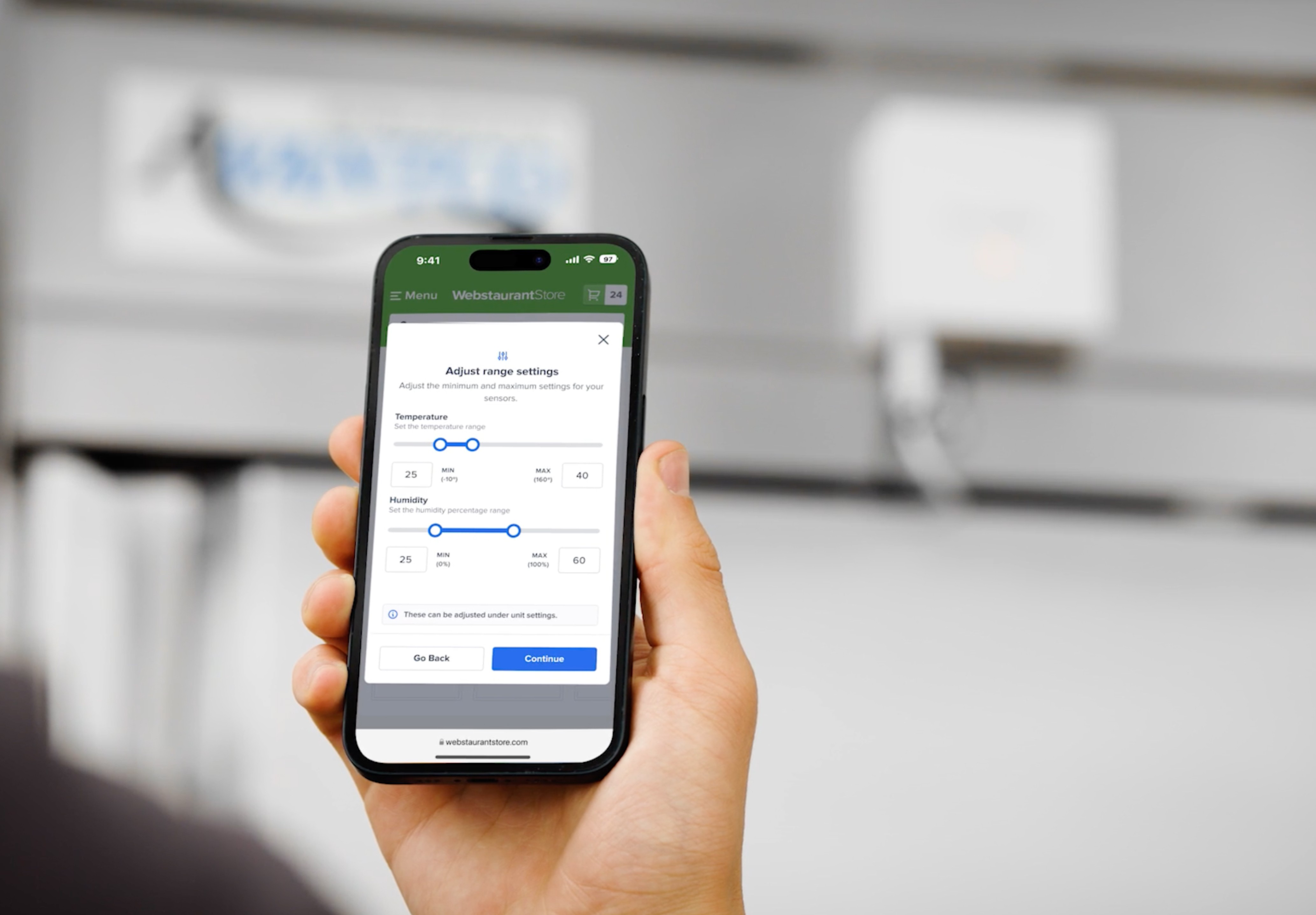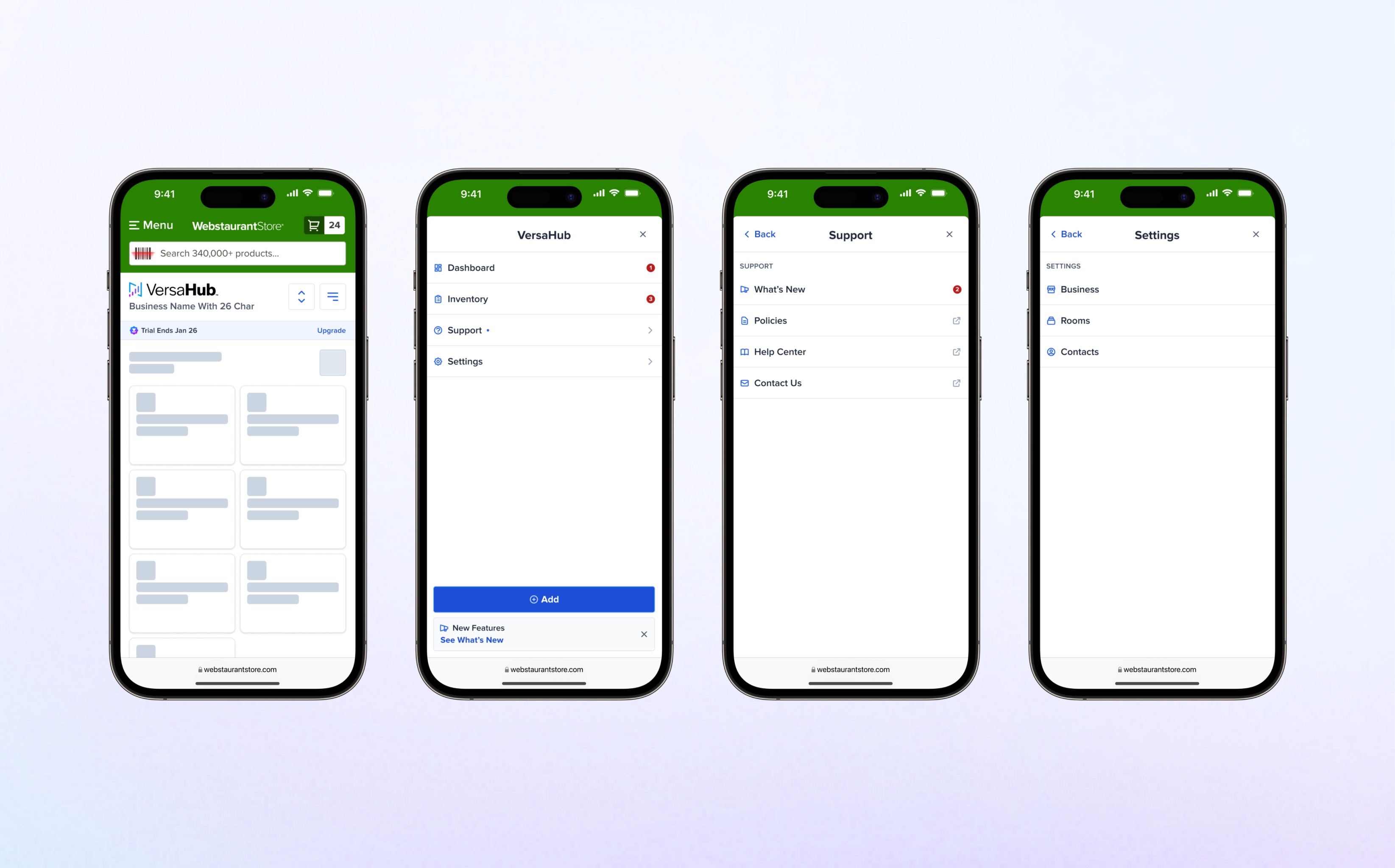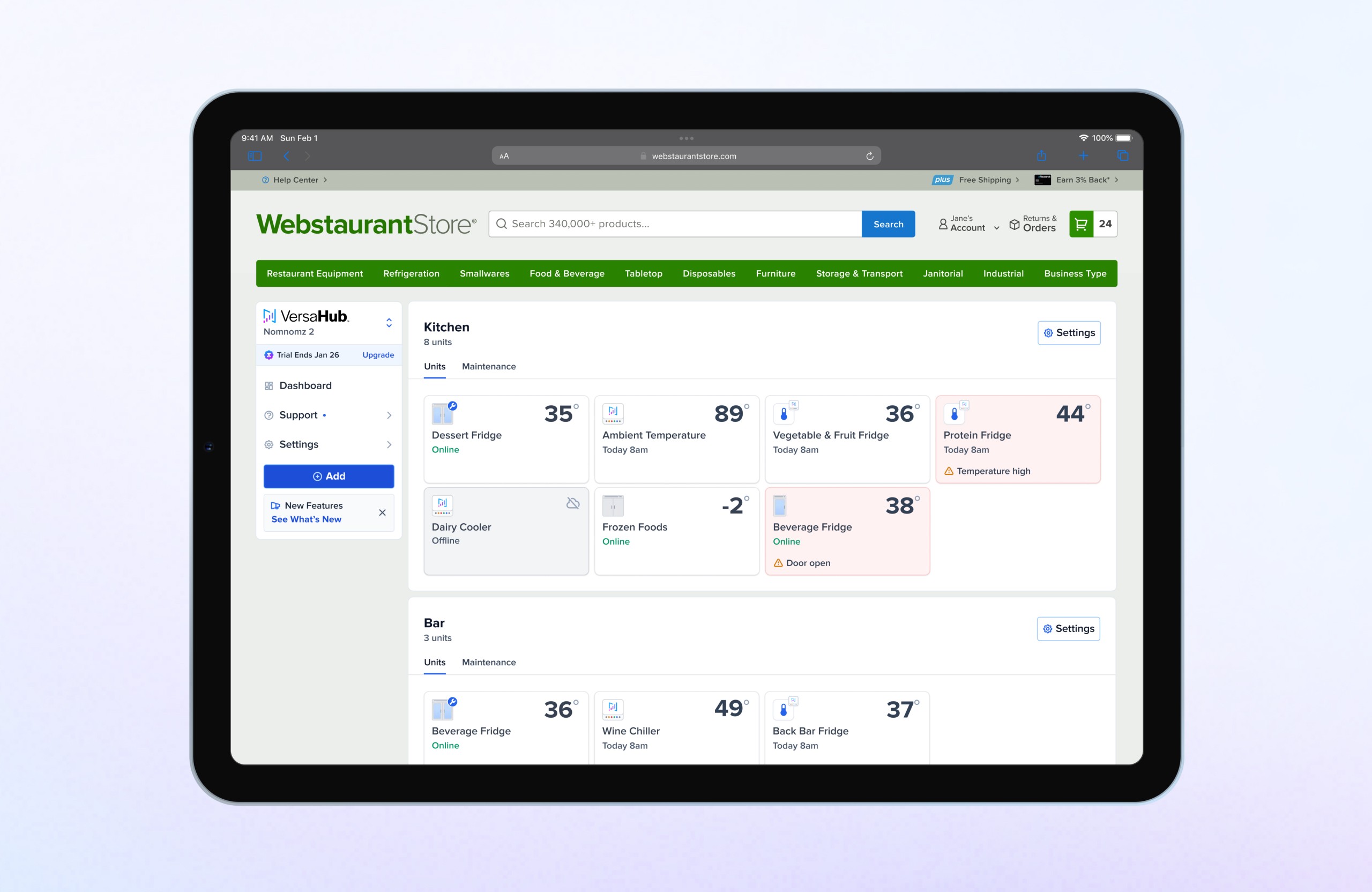Case Study
Driving ~25x Growth with Smart Multi-Sensor Device
Redesigned the platform for a multi-sensor hardware, driving organic user growth and delivering greater value to customers.
3min
Project Overview
I led the redesign of WebstaurantStore’s IoT platform to launch its first affordable smart device, VersaTile. Through hands-on design, the dashboard and unit management experience were improved, driving an increase in active users and laying a strong foundation for future product launches.
Status
Shipped
Contribution
Lead Product Designer
Year
Q2 2023
Product
B2B SaaS Platform
Audience
Foodservice Professionals
Skills
UX Design
Product Strategy
User Research
Prototyping & Testing
Design System
Content Design
Final Solution
25x
User growth
+30%
Repeat purchases
5-Star
Customer reviews
Instant Data Insights
We improved data visualization in VersaTile and legacy smart equipment by adding graphs with peak indicators, time tracking, alerts, and thresholds—keeping insights clear without clutter.
Robust Notification System
Real-time alerts help premium and trial users stay ahead of issues. VersaHub’s flexible, modular system supports temperature, flood, and current sensing, sending instant email or SMS notifications when anomalies are detected—making monitoring seamless and proactive.
The
$locationName
$unitName
$sensorName
$alertMessage
.
Intuitive Setup
We streamlined VersaTile’s setup to simplify activation and facilitate multi-unit setup to improve onboarding and ensure seamless support for new hardware while integrating with existing systems.
5-Star Customer Reviews
Customizable Settings
We designed the settings interface for all skill levels, focusing on accessibility so busy operators feel confident. Each setting balances brevity and clarity, using familiar language, intuitive controls, and contextual help to simplify configuration.
Problem statement
How might we help restaurant owners easily access affordable equipment without technical headaches?
Cost Barriers
Many can't afford new fridges or freezers because they're too expensive to buy and maintain.
Unnecessary Expense
Restaurant owners can't use refrigeration equipment they've already bought.
Friction in Activation
Customers got built-in units just in case or skipped smart features because setup seemed too hard.
Tech Limitations
The audience isn’t tech-savvy and needs simple, intuitive solutions that are easy to learn and use quickly
Research
Understanding Our Users
Before building a solution, we needed to understand and define our target audience. We gathered feedback, studied competitor products, and identified common problems.
Market Signals
Equipment malfunction-related losses account for approximately $6,000-$10,000 per incident
Food Industry Association
Staff spends on average 20-40 minutes daily on manual temperature logging
National Restaurant Association
Acceptance Criteria
User Personas

As a user, I need a simple way to set up and monitor my equipment, so I can focus on serving my customers without worrying about downtime.
Sara Thompson — Small Café Owner (Ages 35–40)

As a user, I need centralized monitoring and customizable reports to manage equipment across multiple locations efficiently.
Michael Rodriguez — IT Manager, Mid-Sized Chain (Ages 35–45)

As a user, I need timely alerts and insights from an easy-to-use system, so I can ensure equipment reliability and focus on enhancing the dining experience.
Emily Chen — GM, Upscale Restaurant (Ages 40-50)
Understanding Hardware Capabilities
In collaboration with Product and Engineering, we mapped user flows that balanced technical feasibility with user needs, that helped shape the MVP through evaluations that uncovered key pain points.

Process
Defining Information Architecture
I turned our research findings into wireframes, helping connect key insights. This collaborative process involved brainstorming with engineering and product teams, ensuring alignment, gathering feedback, and driving continuous improvements.
Designing VersaTile's Dashboard and Sensor Cards
While designing the VersaTile sensor card, we merged redundant dashboard and sensor cards into a unified, adaptable component that works across VersaTile, legacy equipment, and all devices, ensuring clear visual differences between sensors and primary units.
Improving Setup Connection Step
After launch, we noticed some users struggling with the connection step by clicking the WiFi name, thinking it was a button. I flagged this to the Product Manager, and we quickly prioritized and shipped a fix.
MVP
v2
By tracking user sessions, we identified setup issues, refined the process based on feedback, and made onboarding smoother, ultimately leading to more new sign-ups.
Sync and Recording Settings
In the MVP, users had full control over connectivity settings, but data showed they were rarely used. Customer feedback also revealed battery life was a key concern, and the default settings were unclear, adding complexity and draining power.
MVP
v2
We simplified the panel to “Battery and Sync” and replaced complex settings with four simple easy-to-use presets.
Building a Scalable Design System
This project became the foundation for our design system, ensuring consistency. Each reusable component was tested before adding it to our library, with Figma variants, docs, and guidelines in our wiki.
This documentation streamlined design-to-engineering handoffs, accelerating development cycles by 42%.
From Prototypes to Final Implementation
I built interactive prototypes (like the one below) to showcase key user flows like settings and setup. After aligning with the team through feedback, I created high-fidelity designs and detailed dev documentation.
During launch, I worked closely with dev and QA teams to ensure the final product matched our design vision.
Notes
Closing Notes & Takeaways
This project highlighted the power of user-centered design and collaboration in building scalable, intuitive solutions. By acting on user feedback, we made meaningful improvements while setting the stage for future innovation.
Acknowledgments
Proud and grateful to have collaborated with brilliant people from Product, Engineering and R&D to simplify our systems, drive adoption, and deliver key features together.
Next Steps
Leveraging AI for Smarter Maintenance and Insights
Integrate AI-driven predictive analytics to anticipate maintenance needs, detect trends early, and enhance customer insights and operational efficiency.
Mold Risk Index for Preventative Safety
Add a Mold Risk Index (MRI) that uses temperature, humidity, and airflow data to predict and prevent mold growth, ensuring safety and efficiency.
Feature Adoption Campaign
Promote key features through targeted outreach and user feedback to drive adoption and activation.
VersaTile drove user adoption with its affordability and versatility, setting the stage for future hardware launches like smart dispensers. It also paved the way for AI and machine learning innovations to further enhance customer value.
What do you think? Let's chat!
Would love to hear your thoughts on this project or explore how these insights can shape future design opportunities. Feel free to connect!







































